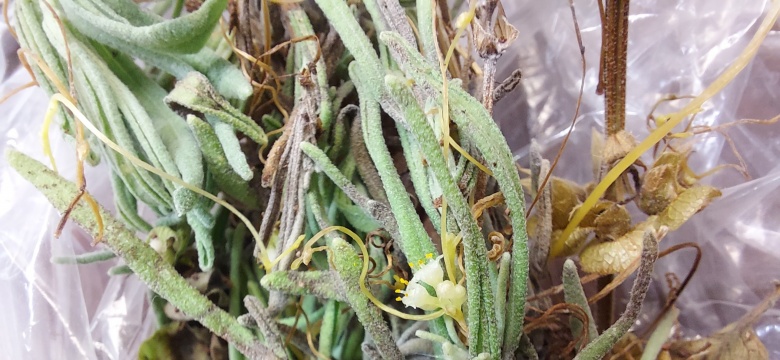DENR Working With Aberfeldy Nurseries to Track Down Basil Plants & Seeds Infested With Dodder

Unfortunately, it has been confirmed that Aberfeldy Nurseries recently sold basil plants infested with the invasive dodder plant and also sold Mammoth Italian basil seed packets (Burpee brand), which may be contaminated with dodder seeds. The Department of Environment and Natural Resources (DENR) is working with Aberfeldy Nurseries to track down 336 Mammoth basil plants propagated and sold by Aberfeldy, along with 43 packets of seed. Early detection of dodder is important in its control – to prevent any potential for widespread infestation.
However, DENR cannot rule out that other outlets could be selling seeds contaminated with dodder – but there is no definitive evidence to support that at this time.
It is imperative that all sightings of dodder are reported to DENR. All Mammoth Italian basil seed packets (Burpee brand, unused and partial packets) are to be turned in to the Plant Protection Laboratory at DENR, or arrangements will be made for collection. It is of critical importance that the dodder seeds do not get released into the environment.
Acting Director of the Department of Environment and Natural Resources Terry Lynn Thompson outlined the dangers of this invasive, parasitic weed. “Dodder is a leafless, parasitic plant that aggressively twines around host plants drawing nutrition from them and eventually killing them. Dodder grows rapidly into dense mats that shade out other plants. Crop yields are reduced as the parasite robs the host plant of nutrients. Dodder plants flower and set seed early in its life cycle. Seeds may remain viable in the soil for more than 20 years. Some of the dodder recovered from the unsuspecting customers’ plants has already begun to flower.”
Acting Director Thompson continued, “DENR issued a public advisory on August 6th 2020, warning about dodder and we urge all customers who have purchased herb plants, in particular basil from Aberfeldy Nurseries, to check for the presence of dodder, and to contact the Plant Protection Laboratory if you suspect it is present. Likewise, all customers who have purchased Mammoth Italian basil seed packets are asked to contact the Plant Protection Laboratory for further instructions. And because this infestation may not be limited to the plants and seeds sold by Aberfeldy, members of the public and local plant nurseries should continue to check all their plants for dodder, and should not plant any basil seed, particularly from Burpee brand Mammoth Italian basil seed packets."
Customers have reported that they purchased the plants from Aberfeldy with the dodder stems and tendrils present. If the dodder stems and tendrils growing on the basil plants had been detected prior to sale, and all of the basil plants originating from the planted seeds destroyed as opposed to disseminated, this infestation could have been prevented.
In the spring of 2013, sweet marjoram seedlings were found to be infested with dodder by a local commercial nursery grower. The grower immediately recognised the dodder and destroyed all of the seedlings, and the dodder, preventing an infestation.
Dodder is one of the most economically detrimental groups of parasitic plants worldwide, with infestations resulting in major crop losses. Eradication efforts could be costly.
Members of the public are encouraged to assist in the eradication of this invasive plant by being vigilant in its detection and by reporting all suspected cases to DENR as soon as encountered.
If you see a plant you suspect may be infested with dodder, report it immediately to the Department of Environment and Natural Resources at 239-2322 or plants@gov.bm. Do not move the plant, as stem fragments or seeds may spread. DENR technical officers will visit the site and safely remove any dodder.
Attached photos: Examples of dodder.